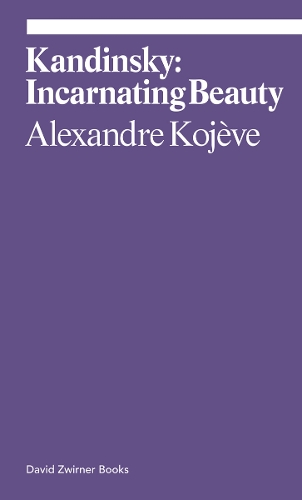
Kandinsky: Incarnating Beauty
(Paperback)
Publishing Details
Kandinsky: Incarnating Beauty
By (Author) Alexandre Kojve
Introduction by Boris Groys
David Zwirner
David Zwirner
13th January 2023
3rd November 2022
United States
Classifications
General
Non Fiction
Philosophy: aesthetics
History of art
759.7
Physical Properties
Paperback
80
Width 108mm, Height 178mm
80g
Description
A teacher to Jacques Lacan, Andr Breton, and Albert Camus, Kojve defined art as the act of extracting the beautiful from objective reality. His poetic text, "The Concrete Paintings of Kandinsky," endorses nonrepresentational art as uniquely manifesting beauty. Taking the paintings of his renowned uncle, Wassily Kandinsky, as his inspiration, Kojve suggests that in creating (rather than replicating) beauty, the paintings are themselves complete universes as concrete as the natural world. Kojve's text considers the utility and necessity of beauty in life, and ultimately poses the involuted question: What is beauty
Including personal letters between Kandinsky and his nephew, this book further elaborates the unique relationship between artist and philosopher. An introduction by Boris Groys contextualizes Kojve's life and writings.
Author Bio
Alexandre Kojve (1902-1968), born in Moscow to an aristocratic family, was a philosopher and statesman who greatly impacted twentieth-century French philosophy. Educated in Berlin and Heidelberg, Germany, Kojve completed his PhD thesis on Vladimir Solovyov, a Russian religious philosopher influenced by Hegel. After moving to France, he gained acclaim for his lectures on Hegel's Phenomenology of Spirit, held at the cole pratique des hautes tudes in Paris from 1933 to 1939. Attended by many French intellectuals of the day, including Georges Bataille, Andre Breton, Jean-Paul Sartre, and Jacques Lacan, Kojve's lectures were later published in French (1947) and English (1969). In 1936, Kojve wrote an influential text on the concrete paintings of his uncle, the abstract artist Wassily Kandinsky. After World War II, Kojve worked in the French Ministry of Economic Affairs, where he was instrumental in shaping the country's foreign trade and economic policies. He was a central participant in negotiations leading to the General Agreement on Tariffs and Trade (now the World Trade Organization), and his work brokering the Treaty of Rome helped establish the European Economic Community (now the European Union).
Boris Groys is a professor at the College of Arts and Sciences, New York University, and professor of philosophy and art history, EGS, Saas Fee, Switzerland. He is the author of the books: An Introduction to Antiphilosophy, Under Suspicion: A Phenomenology of Media, On the New, In the Flow, Logic of the Collection, and Philosophy of Care.
